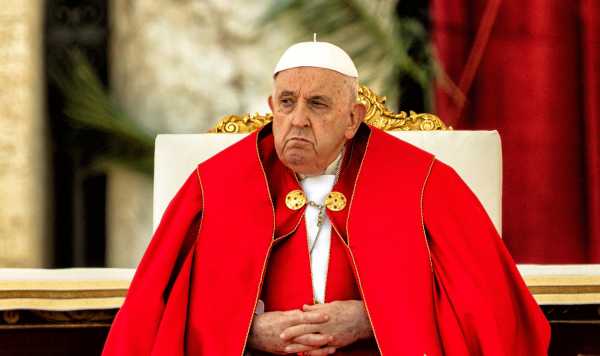The late Pope was guided not by ideology, but by power.

Credit: Fabrizio Maffei/Shutterstock Loading the Elevenlabs Text to Speech AudioNative player…
“You are Peter, and on this rock I will build my church. And the gates of hell shall not prevail against it.” Like most promises, this statement makes less sense than it might at first appear. If the Catholics are right, it is a promise of final victory, to be sure; but it is no more than a guarantee of mere existence. It does not ensure a good or especially holy steward, a large following, or a positive public reputation. It only guarantees continued existence, and other, much older religions—Zoroastrianism, Jainism, Hinduism—have managed this, and will likely continue to manage it, without the divine approval of our Lord.
Longevity does not equal health. That’s one of the clear lessons of the late Pope Francis’s pontificate. When the Argentine pontiff died Monday morning, he had apparently been suffering from ailments for at least five years, dating back to his alarming abdominal surgery in 2023. Like ruler, like kingdom. (The Golden Bough, folks: check it out.) In Catholicism’s traditional territories, there are fewer people in the pews than ever, the Vatican is close to financial collapse, and in the global south, the Church is losing ground to evangelical unrest. Everyone agrees on the symptoms; the causes vary. Where commentators, especially the good old serious American press, got Francis wrong was in assuming that the man was genuinely ideological in some way. It's evident in the headlines about his passing, the celebratory tributes from liberal CNN and the somewhat darker stuff from traditionalist Catholic blogs.
He was indeed destructive, and in ways that often favored liberals. But destruction itself, not liberalism, was his main goal. He was quite happy to slam the press at the expense of “faggots,” or to talk about Satan in dark, medieval terms. (His favorite conductor was Furtwängler, for fuck’s sake. How many liberals do you know whose favorite Wagnerian is Furtwängler?) No, the essence of the Franciscan papacy was control, the exclusive monopoly of power by the one in the pulpit. The constant changes in the curia, the undermining of established authority, and the deliberate insult to prominent papabiles; the refusal to promote bishops from ordinary seats to cardinals, preferring instead to hand out red caps to remote corners of the world with weak and ill-defined interests; the betrayal of the underground Chinese church in an ill-conceived deal with the PRC; all steps designed to ensure that there would be no authority in the Roman flock other than Francis’s. The mistreatment of traditionalists is best explained this way. Even as he suppressed traditionalists within the Church, which disproportionately affected the rich, powerful, and relatively conservative American Church, he cultivated friendly relations with the traditionalist Society of St. Pius X. By granting them the right to confession, he effectively brought them out of schism, but their canonical status remains irregular and confusing. Where the law is unclear, the judge has power.
Subscribe Today Get Daily Emails Delivered to Your Inbox Email Address:
Francis has completed the imperial style of the papacy in his own way. In some ways, this was long overdue; it had begun to take shape at Trent and especially at the First Vatican Council. However, the execution
Sourse: theamericanconservative.com






